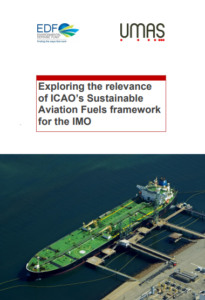Environmental Defense Fund (EDF) and the University Maritime Advisory Services (UMAS) issued a report, highlighting that shipping will fail to tackle its GHG emissions unless it sets rules that truly reflect the climate impact of shipping fuels.
In fact, “Exploring the relevance of ICAO’s Sustainable Aviation Fuels framework for the IMO” report explores how sustainable aviation fuels (SAF) or eligible fuels elements of the International Civil Aviation Organization’s (ICAO’s) market-based climate program, the Carbon Offsetting and Reduction Scheme for International Aviation (CORSIA), could be adopted in the context of shipping.
At the same time, the analysis shows that ICAO’s SAF framework offers “a solid blueprint” for the shipping industry.
As the IMO Initial Strategy strongly encourages the adoption of low and zero-emission fuels, the IMO will need to develop its own framework for evaluating the use of sustainable alternative fuels as a means to meet the GHG targets. While this process took ICAO a considerable period, as a ‘second-mover’ the IMO is well placed to build upon the existing work done by ICAO on SAF.
….EDF and UMAS noted.
According to the report, shipping must adopt a full lifecycle perspective, concerning greenhouse gas emissions, including methane, and ensure accurate calculations of both the direct and indirect impacts of emissions associated with the whole supply chain (extraction/production, transport/distribution and combustion) of the fuel.
The International Maritime Organization and the shipping industry need to put in place the right rules for alternative fuels to truly drive the decarbonisation of the sector and it does not need to start from scratch. The rules recently adopted by ICAO offer valuable lessons and a good starting place for the IMO to chart its course toward a genuinely sustainable shipping sector.
….as Aoife O’Leary, Director with the Environmental Defense Fund said.
What is more, the report calls IMO to adopt strict rules on transparency and ensure that shipping companies accurately report their emissions, and don’t double count emission reductions.
Shipping, as aviation, should ensure that all the emissions from a fuel – from the production to the distribution to the combustion itself – are accounted for if we are to understand the real climate impact. A meaningful policy must incentivise a fair, sustainable and non-perverse shift away from fossil and avoid the risk that emissions are simply shifted elsewhere. Getting this right is mission critical to the shipping industry’s decarbonisation pathway.
…Dr Nishatabbas Rehmatulla, Senior Researcher, UCL and Principal Consultant, UMAS concluded.
Explore the report herebelow





























































